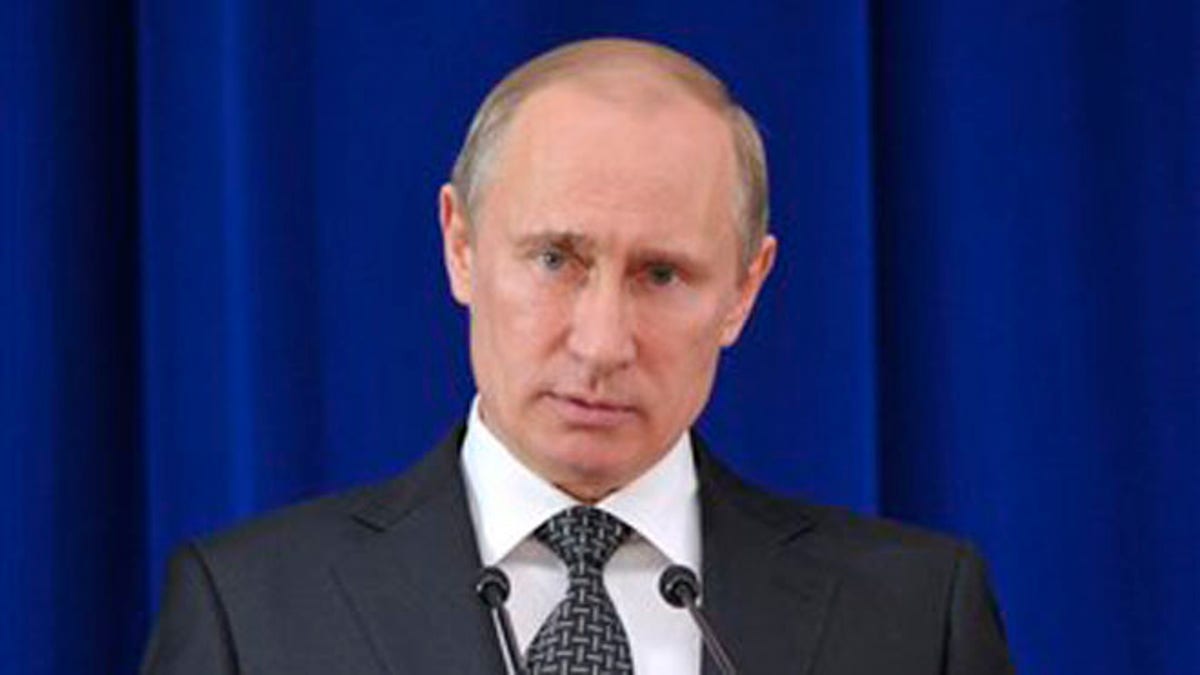
May 30, 2012: Russian President Vladimir Putin speaks at a meeting marking the 20th anniversary of the Russian Security Council in the Kremlin in Moscow. (AP)
MINSK, Belarus – President Vladimir Putin's first foreign trip after being sworn in for a third term reflects a policy course driven primarily by Russia's economic interests.
He travels Thursday to Belarus, where Russia has long had designs on economic assets, and from there directly to Germany and France in an attempt to boost ties with the continent's most powerful economies.
In an executive order released as he returned to the presidency this month, Putin named creating conditions for Russia's economic modernization and strengthening its positions in global markets as his No. 1 foreign policy priority.
Belarus has been Russia's closest ally since the 1990s, when the neighboring countries signed a union agreement that envisaged close economic, political and military ties and set the goal of an eventual merger.
Their relations, however, have often plunged into acrimony, with flamboyant Belarusian President Alexander Lukashenko accusing the Kremlin of trying to wrest control over key sectors of his nation's economy.
After years of resistance, Lukashenko surrendered control last fall over a pipeline that carries Russian natural gas to the West via Belarus, but he has resisted Moscow's push to sell prized industrial assets to Russian business players.
Putin's talks with Lukashenko will likely see another round of tough bargaining, particularly over Belaruskalii, one of the world's largest potash producers.
"The Kremlin is conducting a neo-imperialist policy, snapping up the country's most attractive assets," said Belarus' first post-Soviet leader, Stanislav Shushkevich.
Lukashenko in the past has sought to pit Russia against the West, making periodic overtures to the European Union in a bid to squeeze loans and subsidies from the Kremlin.
But the authoritarian president can no longer play that game now that he has brought relations with the West to a freezing point over his crackdown on the Belarusian opposition. The EU and United States have slammed new economic and travel sanctions on Lukashenko's regime, leaving him to rely exclusively on Russia for support.
"The Belarusian leader has very limited room for maneuver amid international isolation," said Valery Karbalevich, a Minsk-based independent political researcher.
Belarus will play a key part in Putin's plan to form a Eurasian Union, seen by some as an attempt to recreate the Soviet empire.
Moscow also has seen Belarus, which borders NATO member Poland, as an important security asset. The Russian military has an early warning radar system in Belarus and has conducted frequent joint exercises with the Belarusian army, using its air bases and other military facilities.
Defense ties with Belarus may grow more important for the Kremlin amid spiraling tensions over the U.S.-led NATO missile defense system planned for Europe, which Russia sees as a threat to its security.
During his visits Friday to Germany and France, Putin is expected to push for broader access to European energy and other markets and to lobby for Russian businesses interested in acquiring European industrial assets.
Putin may hope that Europe's debt crisis will make Berlin and Paris more receptive to Russian proposals.
"Putin hopes that amid the crisis and uncertainty, the big countries will reach for support outside their familiar orbit," Fyodor Lukyanov, the editor of Russia in Global Affairs magazine, wrote in a commentary published Thursday.
Putin has long sought to make Europe more willing to embrace Russia-proposed energy alliances and accept Moscow's bids for European industrial assets by threatening to redistribute Russian oil and gas flows to energy-hungry China.
Moscow also has found common ground with Beijing in countering what both countries perceive as a U.S. drive for global domination. They have pooled efforts to resist Western pushes for sanctions against Iran and Syria.
As part of their efforts to counterbalance Western influence in the resource-rich Central Asian region, Russia and China set up a regional security grouping. Putin travels to Beijing on June 6 for a summit meeting of the Shanghai Cooperation Organization.
The series of trips underlining Putin's foreign policy priorities follows his refusal to visit the United States for the Group of Eight summit of leading industrialized nations, which many saw as a snub.








































